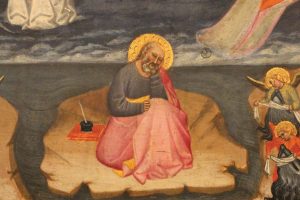This is a test. Please concentrate. What name pops up when you think: Catholic Church and science? OK, try another. The Catholic Church and literature; what's your first association? The church and women's equality; what's the topic? Think about the church and trials; what institution springs to mind?
If you are like members of my not-wholly-scientific survey group, you have answered: a) Galileo; b) censorship; c) an all-male priesthood; and d) the Inquisition. Right? Even the best-educated Catholics-indeed especially some of the best-educated Catholics-picture the Catholic Church as an institution that has devoted 2,000 years largely to thwarting progress, oppressing women, and persecuting unbelievers. Of course, the media have hardly strained to correct this caricature.
The Inquisition motif falls particularly hard on my lawyer ears. During the Starr-Clinton-Lewinsky circus, a widely read columnist here in New York wrote about the impeachment proceedings: "Here you had Henry Hyde leading what looked like the march of the cardinals and bishops, and you had Senator Strom Thurmond who couldn't get a job anywhere else playing the role of Grand Inquisitor. The only things missing were the red cardinals'hats and the pope's hat." Much more recently, a New York Times article gratuitously reminded us that "Cardinal Ratzinger's office was once called the Holy Inquisition." The Inquisition persists as the distinctly Catholic metaphor for all things draconian.
To be sure, the Inquisition represents a grotesquely sinful chapter in Catholic history. Even if modern scholarship-for instance Henry Kamen's The Spanish Inquisition: A Historical Revision (Yale University Press)-makes plain that those ecclesiastical courts compared favorably to their secular counterparts throughout Europe, we should deeply lament the human suffering of the Inquisition's victims.
Still, the Inquisition hardly represents Catholicism's total contribution to legal process and theory. Insisting on a logical approach to fact-finding, medieval canonists incorporated evidentiary distinctions today essential to all lawyering. And legal historians identify nobody more than Spanish priest-philosopher Francisco Suarez as the founder of international law.
England's use of juries in criminal cases took hold after the Fourth Lateran Council condemned trial by ordeal. More broadly, as medievalist Norman Cantor insists, the common law tradition that anchors our legal system is the fruit of pre-Reformation-that is Catholic, not Protestant-England. Of course, you won't glean such legal history from current media, highbrow or low.
Good news not deemed fit to print
When the subject is the church and science, again, you'll read about Galileo. Not about Dominican Albertus Magnus, a leader in experimental science. Not about the Parisian mathematician and philosopher Marin Mersenne-a mentor to Pascal-who in the first half of the 17th century served as Europe's one-man clearinghouse for scientific and mathematical research and who laid the foundations for both the Academy of Sciences in Paris and the Royal Society in London.
You don't read much about the Austrian monk Gregor Mendel, whose work on the laws of heredity grounded modern genetics. The Catholicism of Louis Pasteur or Guglielmo Marconi wins little note. But you read about Galileo.
If you hear about the Catholic Church and literature on some thoughtful program, say on public radio or television, prepare for an earful about the now-defunct Index of Forbidden Books or old efforts to ban the works of James Joyce.
You don't hear about the Catholicism of Gutenberg or Chaucer or Dante. It's funny: Some years ago William Manchester wrote a book in which he declared as negligible the medieval contribution to literature. I guess the Inferno and Canterbury Tales don't count.
Who reminds us today of the church's role in the founding of virtually all Europe's great universities? Without Thomas Cahill's How the Irish Saved Civilization, few would have heard about the monks who preserved the intellectual treasures of antiquity after the fall of the Roman Empire.
Finally, if the topic is the Catholic Church and women's equality, focus likely turns to the present exclusion of women from ordination. Don't get me wrong: The question of women and Holy Orders certainly deserves attention. I hope and pray the ordination of women comes to pass at least in my daughter's lifetime. (How does Catholicism acknowledge that women can be blessed with the stigmata-the literal bearing of Christ's wounds-yet insist that women can't image Christ and therefore celebrate Mass?) The gender bar to ordination alone, however, neither captures nor defines the rich and often paradoxical relationship between the church and women.
In the remnants of the Roman Empire, where female babies in particular were treated as disposable, it was the church that fought infanticide. More, those spared lived in a world where women would come to enjoy a fuller life of the mind, thanks to the church.Whether through Abbess Hilde of Whitby in the 7th century, the Bishop of Orleans in the 8th century, or the Ursulines founded in the 16th century, the church-more than any other institution in world history-advanced women's education. This transformed and enriched countless girlhoods and, more broadly, signified recognition of a dignity in womanhood largely beyond the imagining of many earlier cultures.
But speaking of cultures, can we honestly say that women today are accorded more dignity in our hedonistic, anything-goes society than in our church? Next time you are at Mass take measure of the respect accorded women in the words and images of that liturgical setting, however imperfect. Then go out and compare it against the respect accorded women in our larger commercial society-a society in which young girls are blinded by distorted, emaciated body images and deafened by the message that worth requires beauty; a society in which-decades after the women's movement challenged the objectification of the female body-women's bodies, more than ever, animate advertising.
What's the harm?
Now some might say, "OK, the church is frequently put in an unfair light, but what's the harm?" Well, certainly all the bias in the world will not threaten the church itself. In the 19th century the English politician and historian Thomas Macaulay-no friend of the church-wrote:
"She [the Roman Catholic Church] saw the commencement of all the governments and of all the ecclesiastical institutions that now exist in the world; and we feel no assurance that she is not destined to see the end of them all. She was great and respected before the Saxon had set foot in Britain, before the Frank had crossed the Rhine, when Grecian eloquence still flourished in Antioch, when idols were still worshiped in the temple of Mecca. And she may still exist in undiminished vigor when some traveler from New Zealand shall in the midst of a vast solitude take his stand on a broken arch of London Bridge to sketch the ruins of St. Paul's."
No, the church will survive no matter how hostile the atmosphere.
How well will our society fare, though, if the smearing of our Catholic heritage keeps up? What if our culture continues to echo with the notion that Catholicism is the great spiritual imposter of world history, the institutional accumulation of 20 centuries of moral failings? Such a distorted historical vision chokes off the ability to draw on Catholicism's wisdom. It narrows access to that wisdom just when humanity must choose between two radically different visions of our future: between living in a society of personhood and existing in a soulless system of consumerism.
The choice stands stark, and the stakes high. "The person" has a mind and cherishes the gift of reason-a gift celebrated in our church from Augustine, Thomas Aquinas, Bonaventure, Thomas More, and Descartes to Karl Rahner and John Courtney Murray and to theologians today like Elizabeth Johnson. "The consumer" is essentially mindless, prizing sensation over thought. To the extent that "the consumer" sustains consciousness, that consciousness serves as a mere target area for saturation bombing. Every day we face a barrage of stimuli meant to condition us toward commerce. The human mind has been drawn into a war of attrition with mass culture. And mass culture seems to be winning.
"The person" lives in a morally defined society in which a divinely imprinted dignity warrants respect for every individual life-rich or poor, sick or well, born or unborn, innocent or criminal. "The consumer," in contrast, occupies a bread-and-circus world in which utility measures human worth and the highest law is supply and demand, a world in which family privacy and emotional integrity take second place to network profits generated by daytime talk shows that exploit pain and celebrate dysfunction.
In the personalist society, on the other hand, the economy exists for human beings, not human beings for the economy. The person recognizes that the common good trumps any distorted, absolutist notions of property. Indeed it was the ultraorthodox G.K. Chesterton who observed that letting one citizen own all the resources no more honored the concept of property than allowing one person to have all the spouses honored marriage.
"The person" asks just how we will survive as a democracy when to match the wealth of the top 1 percent one must combine the wealth of the bottom 40 percent. "The consumer" has neither the critical faculty nor collective sense of self-interest required to raise these concerns.
"The person," connected to other persons, retains his or her natural aversion to violence-an aversion so hardwired into our species that military trainers have only recently learned to override it. "The consumer," in contrast, takes prurient, desensitizing interest in violence as entertainment.
Last, "the person" sustains a genuine spirituality, one that combines elements of comfort and challenge, affirmation and negation, faith and doubt, joy and sorrow-the elements common to Catholic spirituality in all its beautifully diverse schools, forms, and traditions over the centuries.
"The consumer" seeks meaning in an endless stream of superfluous products and frivolous services. When such distraction wanes, he or she turns to the commodified spirituality being peddled these days like so much metaphysical fast food from one coast to the other. This prefab spirituality, as Newsweek editor Ken Woodward observes, is "detached from the moral choices and conduct that produce character."
Neoconservative Irving Kristol once observed that the bleak moral ecology of our secular, materialist society comes as no great surprise. Catholic social thinkers predicted it. It was foreseen by the lights of the very church that today so many would relegate to the Museum for Embarrassing Anachronisms.
Honor your mother
So finally, what to do? How do we shore up our church so to make its keen insights and eternal truths accessible in the struggle to save the person from extinction?
First, think ahead. Take the time to help our children, nieces, nephews, and grandchildren understand their Catholic heritage in a rich, balanced, and nuanced fashion-not a whitewashed one, yet not a tarbrushed one either. Perhaps our parents' generation too often thought the church could do no wrong. That error, however, cannot be righted by allowing our children to think of the church as an entity incapable of right.
Similarly, if differences among faiths were once overemphasized, neither truth nor charity gains a stronger footing by ignoring differences today. We cheat ourselves and our brothers and sisters outside the church by equating pluralism with relativism or by reducing belief to a set of lowest common denominators.
Second, listen to a Protestant. The great theologian Reinhold Niebuhr warned that one can be pure or responsible but not both. Some will say, yes, I am Catholic; it's just there are too many things wrong with the church for me to defend or promote it. I won't dirty my hands.
Well, there can be no such thing as Catholicism without a Catholic Church. And one cannot credibly or constructively wield influence over the church while shunning responsibility for its care and feeding. Every good reformer is also a steward-as every good steward is also a reformer.
Third demand for your faith the same respect you would demand for any other. Irreverence is healthy, especially in a faith centered on a God incarnate. One of my all-time-favorite Christmas cards portrayed our Lord seated among his apostles. Somebody had left the door open. The caption for Jesus reads: "Would you close the door? Do you think I was born in a barn?"
Irreverence differs from sacrilege, however. Kidding differs from mockery. We should muster honesty and courage enough to acknowledge those differences.
I attended a theater benefit a couple of years ago, and during the intermission Malachy McCourt got up to say a few words about his brother, the talented and bestselling Frank McCourt. A high point of his praise was that nobody could "kick the shat out of the Catholic Church" like his Frank. The audience laughed along.
Now I know there were more than a few Catholics in the crowd. And I would wager heavily that those Catholics would never have laughed had the ridicule been aimed at an institution held sacred by another segment of the population.
And that's the rub: So often we demand less respect for our Catholic Church than we do for other communities of faith. This might allow us to appear urbane, sophisticated, and terribly worldly. The price gets steep, though.
Finally, give mom a break. The term Holy Mother Church has fallen out of use, and yet it reflects both a spiritual and psychological reality. And you don't have to be sentimental or naive to see this. Echoing the Book of Hosea, Dorothy Day once said, "As to the church, where else shall we go, except to the Bride of Christ, one flesh with Christ. Though she is a harlot at times, she is our Mother."
The church is mother. The difficulty lies in the fact that the church is a mother who can serve as a lifelong scapegoat.
Many-maybe most-people go through some adolescent or young adult stage when they blame every failure, disappointment, and disillusionment in life on their parents. Then you feel the full weight of your own responsibilities and you stop imagining your parents' shortcomings and start wondering whether you will acquit yourself half as well as they did.
With our most demanding parent, Mother Church, no such reality check intrudes. With the church, we can turn the tables of judgment ruthlessly and permanently. We can impose standards of perfection and accountability we as individuals will never test ourselves against. We can hand down withering verdicts against the church-and pretend such scrutiny evinces our own exquisite moral sensibilities.
When amidst our harsh judgments we are reminded of the potential for corruption and sinfulness in any human-run institution, we can reply: "Yes, but this is the church." There shouldn't be sexual impropriety, a single fiscal scandal, the least trace of racism. This is the church!
And when our damning observations make note of all that is good and glorious about the church, we can also reply: This is the church. Of course it staffs hospices, maintains orphanages, and operates hospitals. Of course its schools are often the only sanctuary against the intellectual genocide carried out in our inner cities. Of course the church does these things. It's supposed to do these things. It's the church!
In one breath, we exalt the church with-and impale the church on-our unforgiving expectations. Neat trick. We children of Holy Mother Church are clever if nothing else.
But where is the intellectual honesty? Where is the gratitude? And where lies our future?













Add comment